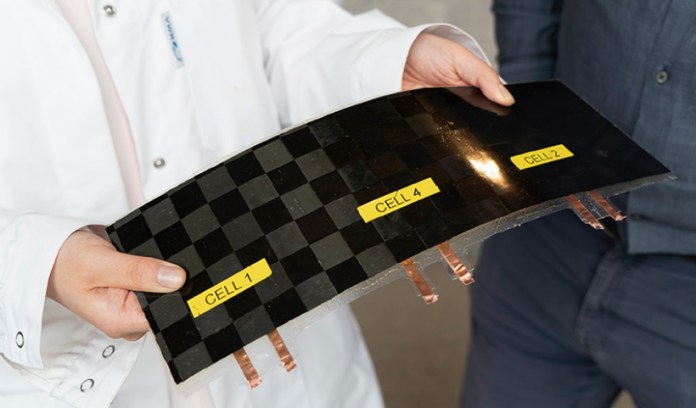Scientists at Chalmers University of Technology in Sweden have developed a structural battery with a carbon fiber that acts as an electrode, conductor, and load-bearing material.
Structural batteries are materials with electrochemical energy storage properties that can be embedded in the structure of an object such as an electric vehicle or a drone. They are essentially aimed at reducing the weight of the object itself.
The scientists said that research and development on “massless” batteries started in 2007. They said that since then the main challenge has been to build devices with good electrical and mechanical properties. However, they claim that their carbon fiber-based battery has good storage properties, as well as the required stiffness and strength to be integrated into the structure of electric vehicles.
“Our battery may also be applied to the roof of city vehicles like rickshaws and similar vehicles which are also covered with solar cells,” researcher Leif Asp told pv magazine.
The battery consists of a carbon fiber (CF) negative electrode and an aluminum film-supported positive electrode separated by a glass fiber (GF) separator in a structural battery electrolyte (SBE) matrix material.
“The CFs act as host for Li, conduct electrons, and reinforce the material,” the researchers explained. “Similarly, the positive electrode foil provides combined mechanical and electrical functionality.”
They also noted that the SBE favors Li-ion transport and transfers mechanical loads between the device’s fibers, particles, and plies. The demonstrated battery showed an elastic modulus of 25 gigapascals and tensile strength exceeding 300 megapascals. Elastic modulus measures the resistance of the material to elastic deformation and tensile strength refers to the maximum load that a material can support without fracturing when stretched.
“The battery has an energy density of 24 Wh/kg, meaning approximately 20 percent capacity compared to comparable lithium-ion batteries currently available,” the Swedish group said. “But since the weight of the vehicles can be greatly reduced, less energy will be required to drive an electric car, for example, and lower energy density also results in increased safety.”
They described the battery in “A Structural Battery and its Multifunctional Performance,” which was recently published in Advanced Energy & Sustainability Research. “We will now test the battery in combination with vehicle-integrated PV and aerospace vehicles,” Asp said.
In May, other scientists at Chalmers University of Technology unveiled a prototype of a rechargeable battery based on cement with an average energy density of 7 Wh/m2.
“This technology is perfectly suitable for large-scale storage of wind and solar energy,” researcher Luping Tan told pv magazine at the time. “It is also perfect for rooftop PV and our primary idea was to produce roof elements with battery functions for storage of energy from PV.”






